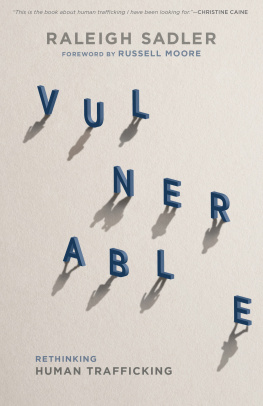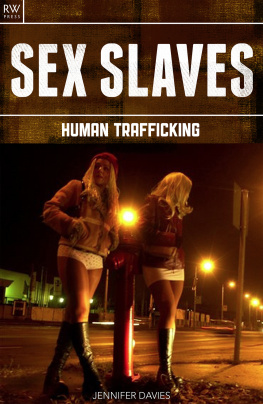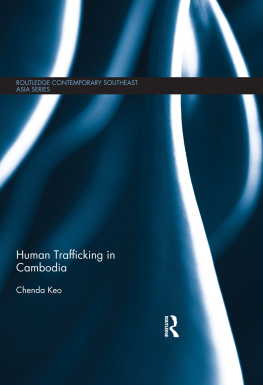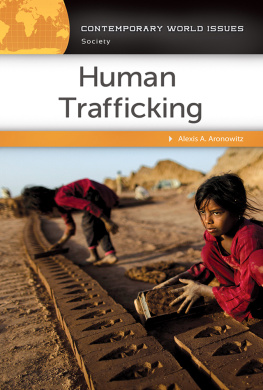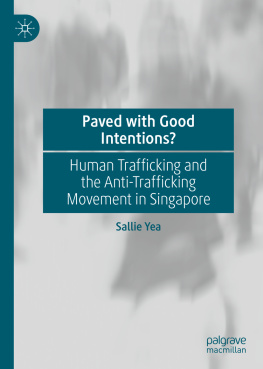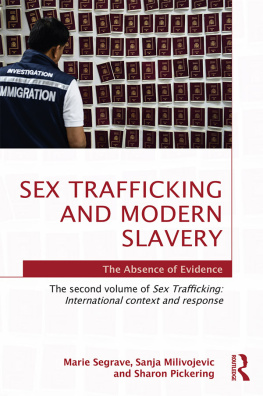PREVENTING HUMAN TRAFFICKING
Solving Social Problems
Series Editor:
Bonnie Berry, Director of the Social Problems Research Group, USA
Solving Social Problems provides a forum for the description and measurement of social problems, with a keen focus on the concrete remedies proposed for their solution. The series takes an international perspective, exploring social problems in various parts of the world, with the central concern being always their possible remedy. As such, work is welcomed on subjects as diverse as environmental damage, terrorism, economic disparities and economic devastation, poverty, inequalities, domestic assaults and sexual abuse, health care, natural disasters, labour inequality, animal abuse, crime, and mental illness and its treatment. In addition to recommending solutions to social problems, the books in this series are theoretically sophisticated, exploring previous discussions of the issues in question, examining other attempts to resolve them, and adopting and discussing methodologies that are commonly used to measure social problems. Proposed solutions may be framed as changes in policy, practice, or more broadly, social change and social movement. Solutions may be reflective of ideology, but are always pragmatic and detailed, explaining the means by which the suggested solutions might be achieved.
Also in the series
Service Sociology and Academic Engagement in Social Problems
Edited by A. Javier Trevio and Karen M. McCormack
Women, Incarceration, and Human Rights Violations
Feminist Criminology and Corrections
Alana Van Gundy and Amy Baumann-Grau
Regulating Alcohol around the World
Policy Cocktails
Tiffany Bergin
The Evidence Enigma
Correctional Boot Camps and Other Failures in Evidence-Based Policymaking
Tiffany Bergin
Preventing Human Trafficking
Education and NGOs in Thailand
ROBERT W. SPIRES
Valdosta State University, USA
ASHGATE
Robert W. Spires 2015
All rights reserved. No part of this publication may be reproduced, stored in a retrieval system or transmitted in any form or by any means, electronic, mechanical, photocopying, recording or otherwise without the prior permission of the publisher.
Robert W. Spires has asserted his right under the Copyright, Designs and Patents Act, 1988, to be identified as the author of this work.
Published by
Ashgate Publishing Limited
Wey Court East
Union Road
Farnham
Surrey, GU9 7PT
England
Ashgate Publishing Company
110 Cherry Street
Suite 3-1
Burlington, VT 05401-3818
USA
www.ashgate.com
British Library Cataloguing in Publication Data
A catalogue record for this book is available from the British Library
The Library of Congress has cataloged the printed edition as follows:
Spires, Robert Weber, 1975
Preventing human trafficking : education and NGOs in Thailand / by Robert W. Spires.
pages cm. -- (Solving social problems)
Includes bibliographical references and index.
ISBN 978-1-4724-4302-1 (hardback) -- ISBN 978-1-4724-4303-8 (ebook) -- ISBN 978-1-4724-4304-5 (epub) 1. Human trafficking--Thailand. 2. Human trafficking--Thailand--Prevention. 3. Non-governmental organizations--Thailand. I. Title.
HQ281.S65 2015
306.36209593--dc23
2014031723
ISBN 9781472443021 (hbk)
ISBN 9781472443038 (ebk-PDF)
ISBN 9781472443045 (ebk-ePUB)
Contents
List of Photographs
About the Author
Dr Robert Bob Spires is Assistant Professor at Valdosta State University. He received his Bachelors and Masters degrees in Secondary Social Science Education and his PhD in Social Foundations with a specialization in International and Comparative Education from the University of Georgia. He has taught as a middle school teacher and trains middle and secondary pre-service teachers and graduate educators in Georgia. His research interests include non-formal education in Southeast Asia, education as a prevention tool for human trafficking, NGOs, Mexican immigrant issues in education, and the use of critical thinking in teacher education and social studies pedagogy. His ongoing collaboration with organizations in Southeast Asia includes research with NGOs in Thailand, Cambodia, and Hong Kong. His wife, Amy, is a school social worker, and his daughter, Jane Claire, is in elementary school.
Email: rwspires@valdosta.edu.
Preface
This book is the culmination of work that spanned from 20092012 and I am thrilled that it may reach a wider audience. The book should not be seen as a definitive work on NGOs in Thailand, but represents a unique glimpse into the work of grass-roots actors in the field. Each NGO working to prevent human trafficking in Thailand faces a variety of unique contextual factors that greatly impact their work, yet some of the issues that they face are similar across Thailand and even the world-at-large. Human trafficking is a complex social problem that is not fully understood, and research on the subject often presents more questions than answers. This study attempts to address a sliver of the issues related to human trafficking but should be seen as an effort on the part of an educator to understand how NGOs address human trafficking through education, what problems the staff and the children face, and what successes staff and children believe they have experienced. My hope is that other researchers and practitioners in the field of human trafficking find something useful in the book to inform their own work and continue fighting human trafficking and exploitation of the vulnerable and disadvantaged around the globe.
Bob Spires, PhD
Acknowledgments
I owe thanks to many important people in my life, without whom, this work would not have been possible. First and foremost, my beautiful and supportive wife Amy helped me throughout the research process, both in the field and at the computer for the writing and editing process. She and my daughter, Jane Claire, spent many mornings and evenings on Skype with me while I was in the field, keeping me energized and excited about the research. I am extremely thankful for the opportunity to participate in Christina Arnolds summer study program through the Washington, DC-based NGO, Prevent Human Trafficking, in 2009, where I met not only the staff of DEPDC and CPDC, but made countless other connections in the field and learned immeasurably about human trafficking and Thailand. My dissertation chair at the University of Georgia, Dr Diane Napier, was also an amazing support throughout the proposal, data collection, writing, editing, and finalizing processes. Dr John Napier, Dr Jay Rojewski, and Dr Larry Nackerud all deserve tremendous thanks for their help as members of my dissertation committee. Dr Simon Baker offered collaboration, insight and hospitality while in Thailand, and for that, I am grateful. The directors of the NGOs, Sompop Jantraka, Supagon Noja, and Radchada Chomjinda were welcoming and I would not have been able to complete the study without their co-operation, hospitality, and collaboration. Finally, the translator for this study, Aor, was a priceless addition to the study and offered insight and a unique perspective into the issues, for which I am very thankful.
List of Abbreviations
| |
|---|
ASEAN | Association of Southeast Asian Nations |
CPDC | Child Protection and Development Center |
DEPDC | Development and Education Programme for Daughters and Communities |
ECPAT |
Next page


